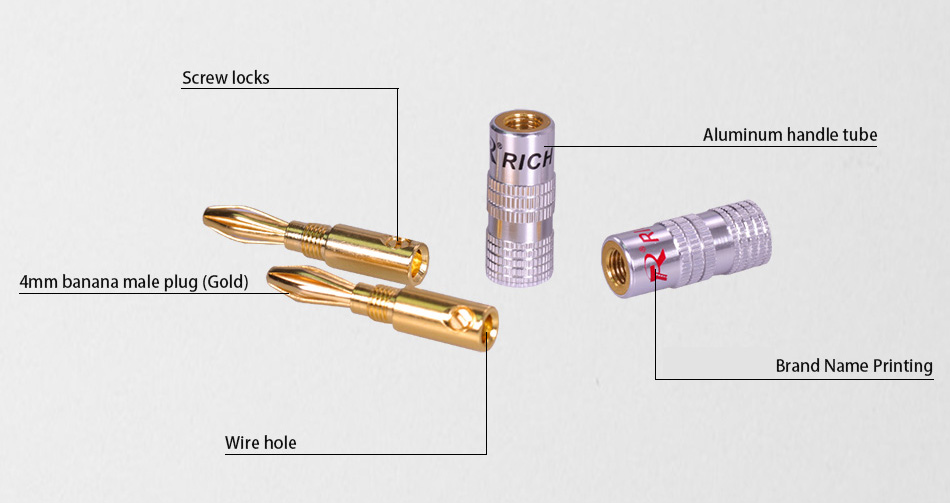
A banana plug
is a type of connector used primarily in electronics and audio applications to create a secure and reliable connection between components. It is designed to connect wires or cables to various devices, such as speakers, amplifiers, receivers, and test equipment. The name “banana plug” comes from its appearance, as the plug typically has a cylindrical or slightly tapered shape with a protruding metal pin that resembles a banana.
Banana plugs are popular for several reasons:
Ease of Use: Banana plugs provide a quick and easy way to connect and disconnect components without the need for soldering or twisting wires together.
Secure Connection: The design of the banana plug, with its spring-loaded pin and the corresponding socket with a collar, ensures a secure and stable connection that minimizes the risk of accidental disconnection.
Low Resistance: The metal-to-metal contact between the banana plug and the socket results in low electrical resistance, which is crucial for maintaining high-quality audio signals or accurate test measurements.
Versatility: Banana plugs are compatible with a wide range of equipment that features banana plug-compatible terminals.
Safety: When used properly, banana plugs can help prevent exposed wires and reduce the risk of short circuits or accidental contact with live wires.
Banana plugs come in various sizes, but they generally have a standard diameter and spacing to ensure compatibility across devices. Some banana plugs are designed for soldering onto wires, while others come with screw terminals or spring-loaded mechanisms that allow wires to be inserted and secured without soldering.
It’s important to note that while banana plugs are commonly used in audio and electronic setups, their usage and availability might vary based on regional standards and preferences. Always ensure that you are using the appropriate connectors for your specific equipment and applications.
Definition of Audio Connectors
Importance of Understanding Audio Connectors
Audio connectors play a crucial role in the world of audio technology, serving as the vital link between audio devices and equipment. Understanding the various types of audio connectors is essential for ensuring seamless connectivity and optimal audio performance. Whether you are a music enthusiast, a professional sound engineer, or simply someone looking to connect their audio devices effectively, exploring the different audio connector types can enhance your overall audio experience. This article delves into the realm of audio connectors, ranging from common types like TRS and XLR connectors to specialized options such as Speakon and TOSLINK connectors, providing insights into their functionalities, compatibilities, and future trends in audio connectivity.
Introduction to Audio Connector Types
So, you’ve got your gadgets, devices, and sound systems all set up, but what’s the deal with all those different plugs and jacks? Time to dive into the wonderful world of audio connector types!
Definition of Audio Connectors
Audio connectors are those nifty little things that help you connect your audio equipment together. They come in various shapes and sizes, each serving a specific purpose in transmitting sound signals between devices.
Importance of Understanding Audio Connectors
Imagine trying to connect your headphones to a speaker and hearing nothing but crickets. Understanding audio connectors is key to avoiding such awkward situations and ensuring your audio setup works like a charm.
2. Maecenas scelerisque interdum dolor in vestibulum. Proin euismod dui purus, non lacinia ligula luctus. Lorem ipsum dolor sit amet.
3. Consectetur adipiscing elit, sed do eiusmod tempor incididunt ut labore et dolore magna aliqua. Ut enim ad minim veniam, quis nostrud exercitation.
4. Nemo enim ipsam voluptatem quia voluptas sit aspernatur aut odit aut fugit, sed quia consequuntur magni dolores eos qui ratione voluptatem sequi nesciunt.
5. Neque porro quisquam est, qui dolorem ipsum quia dolor sit amet, consectetur, adipisci velit, sed quia non numquam eius modi tempora incidunt ut labore et dolore magnam aliquam quaerat voluptatem.
6. Etiam nulla nunc, aliquet vel metus nec, scelerisque tempus enim. Sed eget blandit lectus. Donec facilisis ornare turpis id pretium.